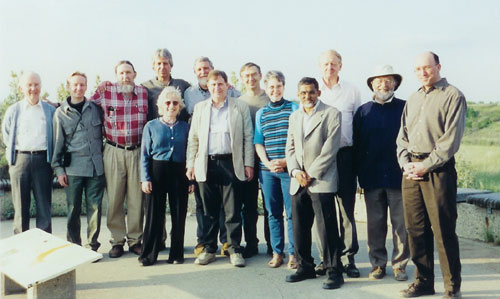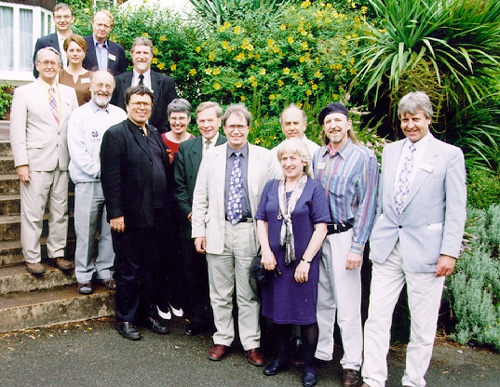The University of Saskatchewan Process Philosophy Research Unit (USPPRU) intends to pursue research through: (1) publications; (2) conferences; (3) dialogue/networking with colleagues both at the University and in the community ; and (4) interdisciplinary research seminars .
The following is a partial listing of on-going developments by USPPRU in these areas:
PUBLICATIONS:
(See the select bibliography for further details)
A. The need to reconceptualise education so that learning taking place in schools and universities becomes more attuned to the needs of students.
B. The importance of rethinking the ecological relationship between human beings and the planet.
C. The relationship between business, universities and research priorities.
D. The history and philosophy of science.
E. Humanistic values and meanings.
CONFERENCES
International Conference "Knowledge, Value and Meaning ...as Process" - Saskatoon 2003

From left to right:
John Cobb, Adam Scarfe, Ed Thompson, Howard Woodouse, Elspeth Crawford, Mark Flynn, Ian Winchester, Bob Regnier, Mary Elizabeth Moore, Chary Rangacharyulu, Pete Gunter, Jack Priestley, Keith Robinson.
“Knowledge, Value, and Meaning … as Process” International Conference Newsflash
At the “Knowledge, Value, and Meaning … as Process” International Conference hosted by the University of Saskatchewan Process Philosophy Research Unit last Thursday, fourteen scholars converged at the Bessborough Hotel to discuss topics pertaining to Process Philosophy, as well as its application to Education and to the Natural Sciences. Peter Gunter’s (University of North Texas) presentation on “Temporal Hierarchy in Bergson and Whitehead” commenced the proceedings in a deeply philosophical light, linking the two process philosophers in the notion of ‘Rhythms of Duration.’ Peter Gunter is the newly appointed chair of the Association for Process Philosophy of Education. Later in the afternoon, Howard Woodhouse presented a paper entitled, “A Process Approach to Community-Based Education: The People’s Free University of Saskatchewan” in which he identified the PFU as an institution imbued with Whiteheadian ideals.
In the evening, over one hundred people from the general public, academia, the student-body, and from various lobby memberships filled the Terrace Room to hear John Cobb’s (Founding Director, Centre for Process Studies, Claremont Graduate School) lecture on “Whitehead’s Theory of Knowledge as a Critique of the Modern University.” The crowd was welcomed by Tom Wishart, Dean of Graduate Studies and Associate Vice-President, Research followed by the warm introduction of John Cobb, by Professor Bob Regnier. John Cobb’s presentation included a thorough critique of universities as not contributing to an ecological world-view. Rather, he concluded that education should be directly centred on solving humanity’s common problems, such as the ecological crisis. Many questions followed the presentation. With a great deal of interest, the session lasted almost three hours. It was filmed both by Shaw Cable and privately by U.S.P.P.R.U.
After a morning filled with presentations on the relationship between the natural sciences and process philosophy, the session in the late morning and in the afternoon on Friday centered on linking Whitehead’s process metaphysics with education. Topics such as forgetting, emotion, feeling, critique, selectivity, contrast, and value were touched upon as seminal to education and to educational practice. Later, conference participants were whisked away for a visit to, and an evening meal at Wanuskewin Heritage Park. After a lively photo-session and a nature walk, participants feasted on salmon and bison. They were then entertained by the intricate guitar-work and vocals of Howard Woodhouse (accompanied by Adam Scarfe on bass guitar), as well as by the thoughtful and humorous songs of Peter Gunter.
At the sessions on Saturday, Elspeth Crawford (University of Edinburgh) further drove home the necessity of the emotions in education from a Whiteheadian perspective. Later, Jack Priestley (University of Exeter) concluded the proceedings with a paper entitled, “Education and the Religious Thinker,” which linked Whiteheadian philosophy with Eastern thought, and pointed to the necessity and importance of religious education. The conference concluded with an evening meal at the Passage to India Restaurant and with some discussion about upcoming International Process Network conferences such as those in Minneapolis, Scotland, and Korea. It was hypothesized that a follow-up conference might be held at Emory University in two years’ time.
The papers from the conference were published in Interchange: A Quarterly Review of Education, Vol. 34, Nos. 1-2, 2003.
-- by Adam Scarfe
International Conference "Education, Ecology and Science" -University of Exter, England 1998
In June 1998, USPPRU organised an international conference, entitled "Education, Ecology and Science" in collaboration with the University of Exeter. Researchers from eight countries participated in the conference which marked the 50th anniversary of the death of Alfred North Whitehead; mathematician, philosopher, educator and one of the founders of process thought. We were able to obtain $5,500 in funding for the conference from both the U of S and elsewhere. In the year 2003, we shall hold a second international conference at the University of Saskatchewan based on the themes and issues of knowledge, value, meaning, and process. Participants at the Exeter conference encouraged us in this endeavour and we will be seeking substantial funds from SSHRC for this second conference. Moreover, we intend to hold other conferences in Europe and/or the United States with the Centre for Process Studies, Claremont College, California and the Catholic University of Lille, France.

Some of the participants at the International Research Seminar, "Education, Ecology and Science", co-organized by the Saskatchewan Process Philosophy Research Unit, which took place at the University of Exeter, England, June 24-26, 1998.
From step down, left to right:
Bob Regnier (University of Saskatchewan, Canada); Pete Gunter (University of North Texas, United States); Sandra Fidyk (Collegio Bolivar, Cali, Colombia); Brian :Hendley (University of Waterloo, Canada); Mark Flynn (University of Saskatchewan); Jack Priestley (University of Exeter, England); Paul Ernest (University of Exeter); Mary Elizabeth Mullino Moore (Claremont School of Theology, United States); Jan van der Veken (Catholic University of Leuven, Belgium); Ian Winchester (University of Calgary, Canada); Elspeth Crawford (University of Edinburgh, Scotland); Garth Benson (University of Calgary); Ed Thompson (University of Saskatchewan); Howard Woodhouse (University of Saskatchewan)
DIALOGUE/NETWORKING WITH COLLEAGUES
USPPRU has circulated a newsletter to participants from the Exeter conference to maintain communication among this network of researchers and keep them informed of the recent work of colleagues. Moreover, we have developed a web site for the Internet and are exploring possibilities to extend working relationships between USPPRU and other universities through faculty exchanges. Members of the unit are also involved in on-going collaborative research efforts with colleagues from the Department of Behavioural Sciences, University of Oulu, Finland and the Higher Institute for Continuing Education, University of Tours, France.

